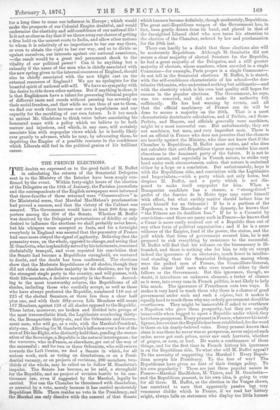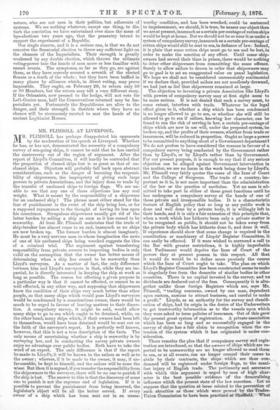THE FRENCH ELECTIONS.
THE -doubts we expressed as to the good faith of M. Buffet in calculating the returns of the Senatorial Delegates sent in to the Ministry of the Interior have been amply con- firmed by the event. Within forty-eight hours of the election of the Delegates on the 16th of January, the Parisian journalists and the correspondents of the English newspapers were informed that three-fourths of those returned were " Conservatives " in the Ministerial sense, that Marshal MacMahon's proclamation had proved a success, and that the victory of the Cabinet was assured. The Government would have at least 200 firm sup- porters among the 300 of the Senate. Whether M. Buffet was deceived by the Delegates' protestations of fidelity or only desired to influence the elections we shall probably never know, but his whispers were accepted as facts, and for a fortnight everybody in England was assured that the peasantry of France had once more obeyed the signal of,pthority. Believing that the peasantry were, on the whole, opposed to change, and seeing that M. Gambetta, who is splendidly served by his informants, remained disdainfully tranquil, and even repeated his conviction that the Senate had become a Republican stronghold, we ventured to doubt, and the doubt has been confirmed. The elections show that the Moderate Republicans of all shades, though they did not obtain an absolute majority in the elections, are by far the strongest single party in the country, and will possess, with their life-members, a decisive majority in the Senate. Accord- ing to the most trustworthy returns, the Republicans of all shades, including those who cordially accept, as well as those who have always preferred the Republic, numbered 110 out of 225 of the elected Senators, or three less than a clear half plus one, and with their fifty-seven Life Members will count 167 Members, against 133 of all shades opposed to the Republic. These latter, moreover, are broken and divided into groups of the most irreconcilable kind, the Legitimists numbering thirty- six, the Bonapartists thirty-six, and the Orleanists and Govern- ment men, who will go, as a rule, with the Marshal-President, sixty-one. Allowing for M. Gambetta's influence over a few of the men of Divine Right, who distinctly hold that, pending the restor- ation of the Sovereign, a Republic is the natural interregnum; for the waverers, who in France, as elsewhere, get out of the way of the successful ; and for two or three Orleanists, who will swerve towards the Left Centre, we find a Senate in which, for all serious work, such as voting on dissolutions, or on a Presi- dential vacancy, or on projects of revisions, 200 members, two- - thirds of the whole, may be relied on to follow M. Gambetta's impulse. The Senate has become, as he said, a stronghold for the Republic, and no project of revision hostile to its con- tinuance can, even if suggested by the Marshal, legally be carried. Nor can the Chamber be threatened with dissolution, or arrested by a veto, merely because it has carried moderately Republican Bills There resides no veto in the Presidency, and the Marshal can only dissolve with the consent of that Senate which has now become definitely, though moderately, Republican. The great anti-Republican weapon of the Government has, in fact, been gently drawn from its hand, and placed in that of the far-sighted Liberal chief who now turns his attention to the election of the Chamber, ordered by law and proclamation for the 20th inst.
There can hardly be a doubt that these elections also will be moderately Republican. Although M. Gambetta did not secure a clear majority of elected Senators for the Republic, he had a great majority of the Delegates, and a still greater majority of electors, whose numbers, when crowded in a single Commune—for example, Paris proper is a single Commune— do not tell in the Senatorial elections. M. Buffet, it is stated, with the self-confidence characteristic of his school—the doc- trinaire Orleanists, who understand nothing but arithmetic—and with the elasticity which is his own best quality still hopes for success in the popular elections. The Government, he says, was too reserved, and did not make its authority felt sufficiently. He has had warning by events, and all that the official machinery of France can do will be done to secure a majority on the 20th. That is a most characteristic doctrinaire calculation, and if Prefets, and Sous- Prefets, and Mayors, and officials generally were machines, might be a most successful one. But unfortunately, they are not machines, but men, and very imperfect men. There is not an official in France who does not perceive that the chances are heavily against the Ministry, who does not know that if the Chamber is Republican M. Buffet must retire, and who does not calculate that anti-Republican vigour may render him most obnoxious to the dominant party of the future. It is not in human nature, and especially in French nature, to strike very hard under such circumstances, unless that nature is sustained either by a hope or a conviction. But unfortunately, hope is with the Republican side, and conviction with the Legitimists and Imperialists,—with a party which not only hates, but despises M. Buffet, and a party which is not dis- posed to make itself unpopular for him. When a Bonapartist candidate has a chance, a " strong-fisted " prefet of the Janvier de la Motto type may exert himself with effect, but what earthly motive should induce him to exert himself for an Orleanist? If he is a partisan of the Napoleons, a true Mameluke of the dynasty, he knows that "the Princes are its deadliest foes." If he is a Ctesarist by conviction—and there are many such in France—he knows that a Ctesar is more easily evolved out of a Republic than out of any other form of political organisation ; and if he is a mere widower of the Empire, fond of the power, the status' and the pelf which that form of government secured him, he is not prepared to risk everything by resistance to the successfuL M. Buffet will find that his reliance on the bureaucracy is ill- founded, and there is nothing else for him to rely on except indeed the ignorance of an electorate, much lower in intellec- tual standing than the Senatorial Delegates, among whom were the picked men of France, the Councillors-General, and the other half men who were trusted either by their fellows or the Government. But this ignorance, though, no doubt, it introduces an unknown element, a factor of chance as it were, into every sum in French politics, is not likely to help him much. The ignorance of Frenchmen cuts two ways. It makes it very hard to teach them why there is a chance of good government under such and such a re'ginze, but it makes it equally hard to teach them why any orderly government should be overthrown. They might be immovable if asked to overthrow a Napoleon who gave them prosperity, but they are equally immovable when begged to upset a Republic under which they have been prosperous. Every peasant in France, whatever his intel- ligence, knows that the Republic has been established, for the word is there on his dearly-beloved coins. Every peasant knows that since it was there he never was so prosperous, never enjoyed such order, never got such prices, never saw such harvests, whether of grapes, or corn, or beet. He wants a continuance of those things, and for the first time in French history his ignorance is on the Republican side. To what else will M. Buffet appeal/ To the necessity of supporting the Marshal Every Repub- lican accepts his Presidency. To the fear of war? The Republicans have given no hint of their foreign policy. To his own popularity? There are just three popular names in France—Marshal MacMahon, M. Thiers, and M. Gambetta- and the Republican peasant, in his own idea, is going to vote for all three. M. Buffet, as the election in the Vosges shows, has contrived to earn that apparently passive but very venomous dislike which in France, if we read heAistory aright, always falls on statesmen who display too little human nature, who are not men in their politics, but adherents of systems. We see nothing whatever, except one thing, to dis- turb the conviction we have entertained ever since the mass of bye-elections two years ago, that the peasantry intend to support the experiment of a Republic.
Our single reserve, and it is a serious one, is that we do not conceive the Senatorial election to throw any sufficient light on the chances of the Imperialists. Their strength is greatly weakened by any double election, which throws the ultimate voting-power into the hands of men more or leas familiar with recent events. The symptoms, so far as they go, are against them, as they have scarcely secured a seventh of the elected Senate or a tenth of the whole ; but they have been baffled in many places by alliances which, in direct voting, may prove impossible. They ought, on February 20, to return only 50 or 60 Members, but the return may tell a very different story. If the Orleanists, now pressed to the hedge, will not vote for Left-Centre men, half the Conservatives returned may be Im- perialists yet. Fortunately the Republicans are alive to the danger, and their strength in districts where they have no chance will be strenuously exerted to seat the heads of the ancient Legitimist Houses.



































 Previous page
Previous page